
Tesla is diving into the next frontier of AI hardware, exploring HBM4 memory chips from South Korean giants Samsung and SK Hynix to supercharge its custom-built Dojo supercomputer. According to a TrendForce report, Tesla has requested samples of the next-gen chips, sparking a tech race between the two semiconductor leaders.
Dojo plays a key role in Tesla’s Full Self-Driving program, training the neural networks that drive its autonomous vehicle technology. With the addition of HBM4, Tesla aims to boost Dojo’s processing power and energy efficiency, potentially deploying the new memory in its data centers and future self-driving cars.
The company’s current systems rely on HBM2e chips, but HBM4 promises a significant upgrade. SK Hynix claims its next-gen memory will deliver 1.4 times the bandwidth of HBM3e while consuming 30 percent less power, exceeding 1.65 terabytes per second. HBM4 also introduces a new integrated logic die that acts as a controller, potentially unlocking additional speed and power optimizations designed for AI workloads.
Samsung and SK Hynix are locked in a fierce competition to dominate the high-bandwidth memory market, projected to grow to $33 billion by 2027. SK Hynix has a slight edge, supplying chips to Nvidia and leading with the production of its 321-layer TLC NAND flash memory. The company plans to start mass-producing HBM4 by late 2025. Meanwhile, Samsung is leveraging its partnership with TSMC and advanced 4nm technology to close the gap, positioning itself as a key contender in this lucrative sector.
Tesla’s interest in HBM4 reflects a broader shift among tech giants. Companies like Microsoft, Meta, and Google are also exploring HBM4 chips to fuel their own AI ambitions, signaling a new wave of innovation in high-performance computing.
Featured Image courtesy of Future Publishing via Getty Images
Follow us for more tech news updates.
